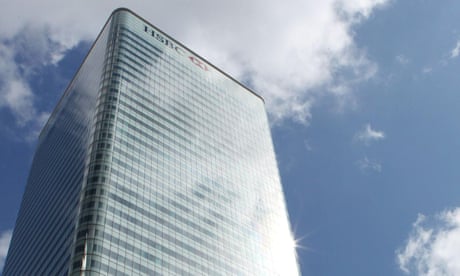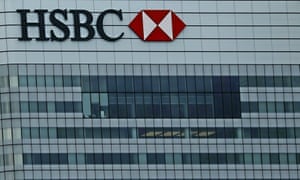Bankers in the UK have faced no prosecutions – despite their serial abuses, and the catastrophic consequences of their actions.
‘Perhaps someone would investigate the culture that enriches a few at the expense of many.’ Photograph: Reinhard Krause/Reuters
So, HSBC is retaining its headquarters in London. Was there ever any danger that it would quit a cosy jurisdiction with feather-duster regulation and prosecutions as rare as hen’s teeth?
Banks have little to fear here, as UK regulators and prosecutors rarely take action.
In 2012, HSBC paid a fine of $1.9bn to US authorities for its role in money laundering by drug traffickers and governments on sanctions lists. The US Department of Justice stated that the bank “accepted responsibility for its criminal conduct and that of its employees”. In 2015, the Swiss authorities fined HSBC 40m Swiss francs (£28m) for “organisational deficiencies” that allowed money laundering to take place in the bank’s Swiss subsidiary. UK regulators twiddled their thumbs.
Leaked documents showed that HSBC’s Swiss banking arm helped around 30,000 wealthy clients dodge taxes. As the primary regulator of HSBC, the Financial Conduct Authority (FCA) promised investigations. Just a few weeks later, Martin Wheatley, the FCA chief executive found that his contract was not being renewed, even though he had some “unfinished business”. In January, HMRC told the House of Commons public accounts committee that it had abandoned its criminal investigation into the role of HSBC in alleged illegal activities.
So, HSBC is retaining its headquarters in London. Was there ever any danger that it would quit a cosy jurisdiction with feather-duster regulation and prosecutions as rare as hen’s teeth?
Banks have little to fear here, as UK regulators and prosecutors rarely take action.
In 2012, HSBC paid a fine of $1.9bn to US authorities for its role in money laundering by drug traffickers and governments on sanctions lists. The US Department of Justice stated that the bank “accepted responsibility for its criminal conduct and that of its employees”. In 2015, the Swiss authorities fined HSBC 40m Swiss francs (£28m) for “organisational deficiencies” that allowed money laundering to take place in the bank’s Swiss subsidiary. UK regulators twiddled their thumbs.
Leaked documents showed that HSBC’s Swiss banking arm helped around 30,000 wealthy clients dodge taxes. As the primary regulator of HSBC, the Financial Conduct Authority (FCA) promised investigations. Just a few weeks later, Martin Wheatley, the FCA chief executive found that his contract was not being renewed, even though he had some “unfinished business”. In January, HMRC told the House of Commons public accounts committee that it had abandoned its criminal investigation into the role of HSBC in alleged illegal activities.

HSBC to keep its headquarters in London
Bankers face no retribution in the UK. Iceland has sent 29 bankers to prison for their role in the 2007-08 banking crash. The UK’s overcrowded prisons could have squeezed in some bankers, but there have been no prosecutions for bringing down the industry and ushering in austerity. The UK finance industry has been a serial offender, as evidenced by mis-selling of pensions, endowment mortgages, payment protection insurance and rigging of interest rates, but successive governments have failed to prosecute.
Abuses are deeply ingrained into the bank business models that pursue ever rising profits and mega performance-related remuneration for executives. Perhaps someone would investigate the culture that enriches a few at the expense of many. Despite the fanfare of an investigation, the FCA, possibly under pressure from the Treasury, dropped its investigation into banking culture.
Auditors are paid vast sums to evaluate internal controls operated by banks. Yet all ailing banks received a clean bill of health before the 2007-08 crash. This should have prompted the regulator, the Financial Reporting Council, to act, but it did not.
Irked by this inertia, Andrew Tyrie MP, chairman of the Commons treasury committee, pressed the FRC to investigate the audits of HBOS, a bank bailed out by taxpayers in 2008. In January 2016, some eight years after the events, the FRC said that it is considering making some “preliminary inquiries”.
It is not only regulators, prosecutors are missing too. In the US, Citicorp, JPMorgan, Barclays, the Royal Bank of Scotland and UBS have pleaded guilty to manipulating the foreign exchange rates, and traders have also been convicted of rigging a benchmark interest rate known as the London Interbank Offered Rate (Libor). In the UK, the Serious Fraud Office has recently lost six cases of alleged rigging of Libor. It previously botched investigation into the collapse of Icelandic banks.
Deep reforms of the finance industry are not on the government agenda. After the banking crash, the government sought to take the heat out of the public debate by appointing an Independent Commission on Banking, under the chairmanship of Sir John Vickers. Its 2011 report recommended ringfencing retail banking from speculative trading. In the interest of stability, the report recommended that banks have a broader capital base to enable them to absorb shocks. Both remain unimplemented. Last Sunday, Vickers complained that the Bank of England had watered down the proposals, and banks might not have enough financial buffers to survive the next crisis.
The above is just a small illustration of the shameless appeasement of the finance industry by the UK government. It is hardly surprising that HSBC and other financial behemoths find London attractive. The finance industry may welcome the government’s capitulation, but the rest us are repulsed by the stench of scandals and bailouts. The UK’s regulatory system has utterly failed and needs to be redesigned.




